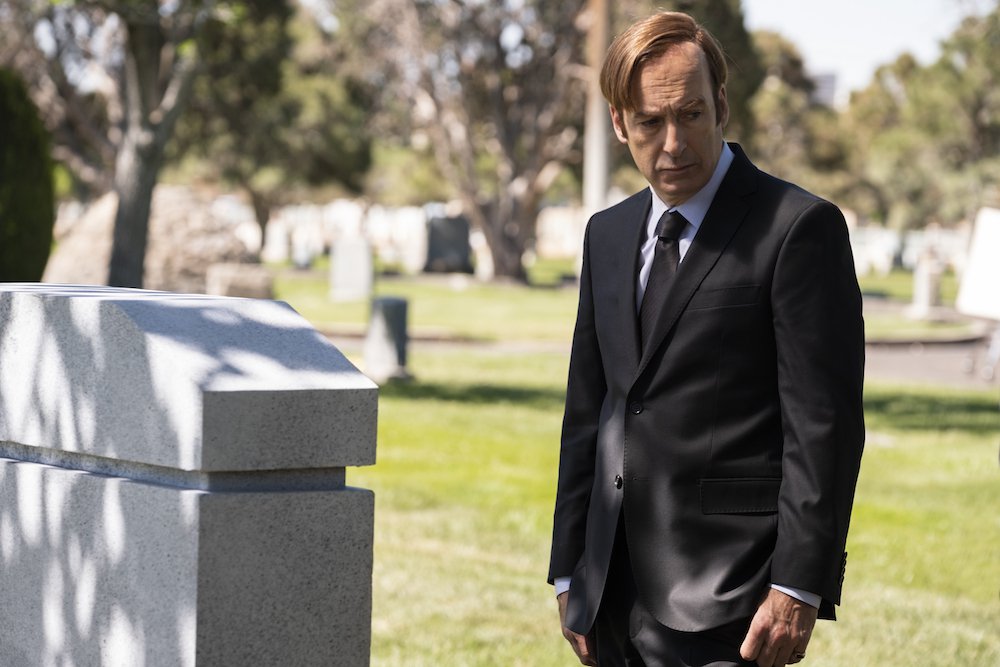What happens to Kim in the build up to Saul Goodman?
The sweetness of the so-called “slow burn” is debatable. I’ve gone back and forth over the years from loving it to hating it to tolerating it, and everything in between, but rarely have I ever seen it work as deliciously well as it does on Better Call Saul, whose entire run so far has been that slow, sweet burn from Jimmy McGill to Saul Goodman, not as drastic a transformation as his infamous successor’s journey from Walter White to Heisenberg, but more bittersweet and heartbreaking, as Bob Odenkirk’s well-meaning Jimmy is ever more slowly (and over a much longer period of time) pushed by circumstances to get back at the world that’s spurned him over and over again.
Better Call Saul is two stories, of course, or arguably even three. There’s the origin story of Jimmy, his tragic, nearly Shakespearean battle with his brother Chuck (Michael McKean), his relationship with girlfriend Kim (Rhea Seehorn) and his struggle to maintain his law license. Then there’s the parallel story of Mike (Jonathan Banks), whose origins were explained in the first season, and whose employment with Gus Fring (the brilliant Giancarlo Esposito), ties the world of the show into the cartel and the inevitable link to its sequel series Breaking Bad. And I would say that there’s a third story in here, lingering on the fringes, which involves the black and white flash forward that begins every season and which, adding it all together, is telling us the story of “Gene” in Omaha, Nebraska- a post Breaking Bad world that I suspect the show will catch up with eventually, perhaps long enough to spend an entire season in.
Mike and Gus get closer to the meth lab this season
The great balancing act of this show is the way it plays with time and takes us between all these stories, placing us deep in the hearts and minds of so many characters in ways that even Breaking Bad didn’t. As a result, we feel that we know Jimmy, Kim, Mike, Chuck, and Gus intimately, we understand their motives and can empathize with their actions, even as we see the desolate directions they’re heading in. There’s a bleakness to this season in particular, as it begins with the death of Chuck and the broken piece of Jimmy he takes with him. He’s seemingly unscarred by his brother’s death, and despite Kim’s efforts to bring a bit of feeling out of him, by season’s end we’re given the impression that that part of him is gone forever, as the echoes of Saul Goodman inch their way in to take over his damaged psyche ever more.
One of the great mysteries of Saul is in the character of Kim Wexler, who as far as we know, did not exist on Breaking Bad, which means there’s an omnipresent question about what happens to her (or doesn’t) before then. The timeline of the show hits 2004 this season, still four years away from Walter White’s entrance into the underworld, so plenty of time for lots of things to happen, and the options are expanded this year, as Kim drifts towards her own dalliance with darkness, as she longs to pull off the con with Jimmy and grows bored and disillusioned with her banking job. That’s one of the bigger surprises of the season, as we realize that Jimmy’s transformation into Saul could very possibly be aided and abetted by her rather than hindered, and we wait to find out more. What heart there is on the show comes from the relationship between these two, and what the end result of this relationship leads to- or does it end at all? Is Kim alive and well all through Breaking Bad, hidden from view as Saul keeps her out of the spotlight? Can she possibly come back in the black and white coda world to help Jimmy/Saul out of his final jam? These questions permeate the season and the series, as we ponder and theorize and see if we can guess at Peter Gould and Vince Gilligan’s end game.
Jimmy pulls his biggest con yet in the fourth season finale
The Mike and Gus portions of the show line up more with direct prequel-land, as we find out exactly how Gus built his underground lab this season, and how Mike descends further into his role as hired hitman. The more Gus is present on the show, the more we remember how much we liked him on Breaking Bad, and the smooth professionalism between the two veteran criminals is inherently felt in their scenes together. I wondered if the show would miss something by the absence of Michael McKean’s somewhat diabolical Chuck (though he does show up in a flashback or two), but the strengthening of Jimmy and Kim’s dynamic makes up for it, as the air of waiting for it all to go horribly wrong and how imbues every frame of this story. Bob Odenkirk carries the show handily with humor and gravitas as Jimmy boils over in frustration and rage by season’s end, giving way to cynicism and amorality that will lead us right to Saul Goodman, as there can’t be too much story left to tell in the build-up. And then we see what happened afterwards. I can’t wait.
Grade: A




